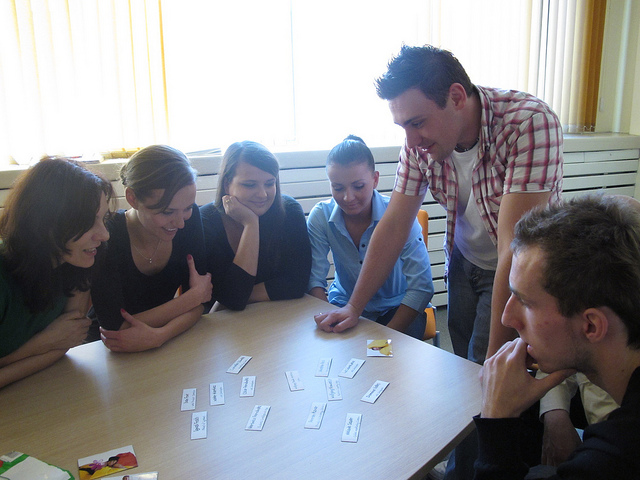
Image Credit: careesma_group
Let’s think about your team for just a moment or two. The people on your team most of the time don’t do things by themselves. Instead, they work with other people on the team in order to accomplish tasks. However, it’s that working together thing that can cause problems. Interpersonal issues can crop up, personalities can clash, and managers (that’s you) despite all of our manager training can provide unclear directions. The result of all of this is that your team members can be left with conflict issues and this can end up stifling your team’s productivity. What’s a manager to do?
What Google Says About Teams
Over at Google they believe that they have most of the answers to the world’s most pressing questions. The reason that they think this is because they collect a great deal of data on just about everything that they touch. They also have the really smart people on staff who have the ability to study that data and determine what it really means.
This was the team of people who set out to answer what on the surface seems to be a fairly simple question. The Google researchers wanted to know what made a team at Google effective? It turns out that this was a really useful study to do. The researchers were able to arrive at some conclusions that none of them had anticipated. What the research team found out is that in the end, what really mattered had less to do with who was on the team and more to do with how the members of the team worked together.
Psychological Safety
The Google researchers created a list of the things that were the most important when a team was trying to do a good job of working together. On top of the list was the need for teams to experience “psychological safety” – this is a shared belief held by members of a team that the team is safe for interpersonal risk taking. It specifically means that “members are not seen as ignorant, incompetent, negative, or disruptive, and that no one on the team will embarrass or punish anyone else for admitting a mistake, asking a question, or offering a new idea”.
The results of the team study that the Google researchers put together showed that teams experiencing higher psychological safety were “less likely to leave Google, they’re more likely to harness the power of diverse ideas from their teammates, they bring in more revenue, and they’re rated as effective twice as often by executives.” What manager wouldn’t want that kind of rating for their team?
The researches at Google didn’t go to all of the effort of studying teams just for fun. Once the Google researchers studied the results and understood the dynamics of their own teams, they put together a discussion guide to empower their own teams and help managers use their manager skills to model psychological safety on their teams. The discussion guides top three suggestions were that managers should respond verbally to members of their team in order to show engagement (“That makes sense. Tell me more”). The research also showed that they should take the time to recap what’s been said to confirm mutual understanding/alignment (e.g., “What I heard you say is …”); then acknowledge areas of agreement and disagreement, and be open to questions within the team. The final suggestion was that managers should validate comments verbally (“I understand” or “I see what you’re saying”).
What All Of This Means For You
We’d all like to become better managers. In order to make that happen, the teams that we manage need to become better teams. Although at times this may seem to be a hard or almost impossible task to accomplish, it turns out that the folks over at Google have been asking themselves the same questions. However, Google has collected a great deal of information on their teams and so they were able to dive in and come up with some answers on what makes a great team.
The Google researchers tackled the question of what made a team at Google effective? What they discovered is that what really mattered is how the different members of the team worked together. It turns out that one of the most important things for the members of the team is “psychological safety” – this is a shared belief held by members of a team that the team is safe for interpersonal risk taking. The results of the study were put into a manual for all Google managers. This manual tells managers to respond verbally to show engagement, recap what has been said to show engagement, and validate comments verbally.
All managers can learn from the Google study. We need to understand what it is that the members of our team find most valuable about being on our team. It turns out that a sense of safety and belonging is what makes them most productive and willing to get back to team building. As managers it is now clear that creating this sense of psychological safety is something that has to be one of our most important tasks.
– Dr. Jim Anderson
Blue Elephant Consulting –
Your Source For Real World IT Management Skills™
Question For You: What can a manager do to create a sense of psychological safety on his or her team?
![]() Click here to get automatic updates when The Accidental IT Leader Blog is updated.
Click here to get automatic updates when The Accidental IT Leader Blog is updated.
P.S.: Free subscriptions to The Accidental IT Leader Newsletter are now available. Learn what you need to know to do the job. Subscribe now: Click Here!
What We’ll Be Talking About Next Time
Ok, so I’m willing to admit it – I’m not perfect. Yes, I am always working to try to become perfect, but so far I have not been able to even get close to that goal. Most managers would say that they are in the same boat as me. It’s a bit depressing to set out to try to accomplish something and then despite using your manager skills you basically fail at doing it. When this happens, because there is no manager training for dealing with failure a lot of managers tend to throw their hands up and say “oh well”. It turns out that this is not the right thing to do. Instead, we should all be doing what the U.S. Army does when they have a failure.

